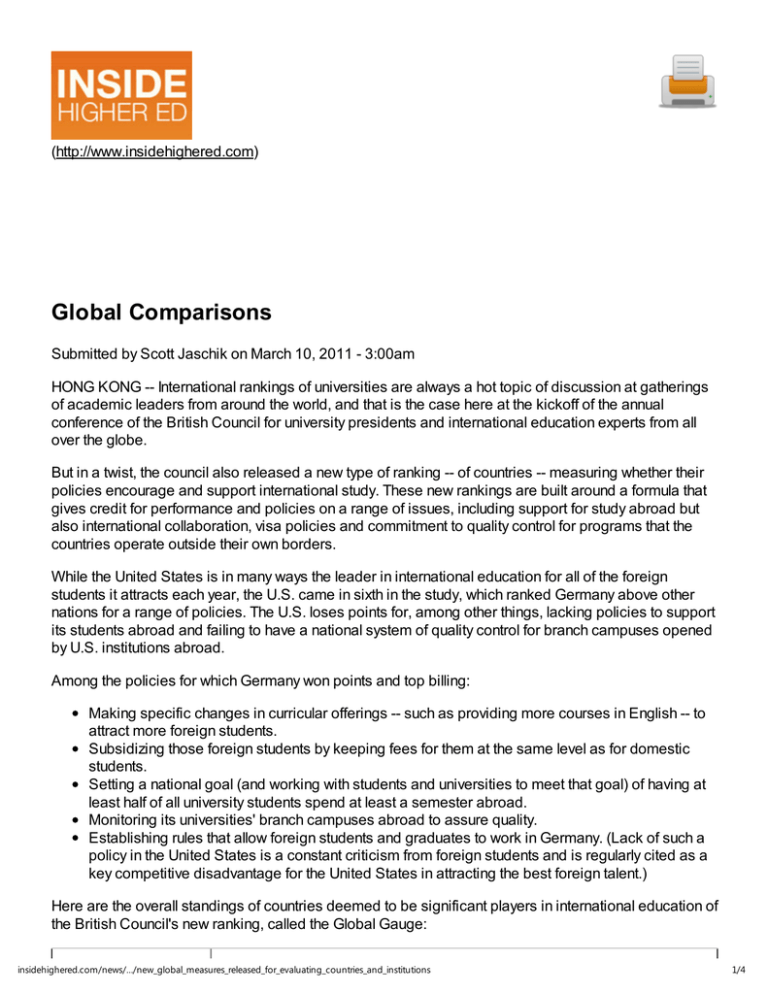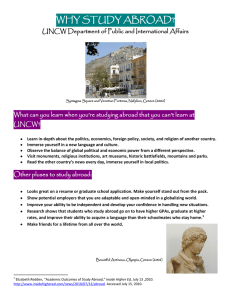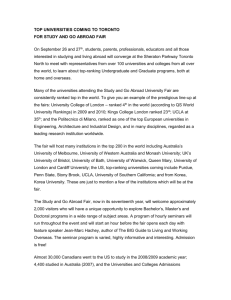Global Comparisons
advertisement

(http://www.insidehighered.com) Global Comparisons Submitted by Scott Jaschik on March 10, 2011 - 3:00am HONG KONG -- International rankings of universities are always a hot topic of discussion at gatherings of academic leaders from around the world, and that is the case here at the kickoff of the annual conference of the British Council for university presidents and international education experts from all over the globe. But in a twist, the council also released a new type of ranking -- of countries -- measuring whether their policies encourage and support international study. These new rankings are built around a formula that gives credit for performance and policies on a range of issues, including support for study abroad but also international collaboration, visa policies and commitment to quality control for programs that the countries operate outside their own borders. While the United States is in many ways the leader in international education for all of the foreign students it attracts each year, the U.S. came in sixth in the study, which ranked Germany above other nations for a range of policies. The U.S. loses points for, among other things, lacking policies to support its students abroad and failing to have a national system of quality control for branch campuses opened by U.S. institutions abroad. Among the policies for which Germany won points and top billing: Making specific changes in curricular offerings -- such as providing more courses in English -- to attract more foreign students. Subsidizing those foreign students by keeping fees for them at the same level as for domestic students. Setting a national goal (and working with students and universities to meet that goal) of having at least half of all university students spend at least a semester abroad. Monitoring its universities' branch campuses abroad to assure quality. Establishing rules that allow foreign students and graduates to work in Germany. (Lack of such a policy in the United States is a constant criticism from foreign students and is regularly cited as a key competitive disadvantage for the United States in attracting the best foreign talent.) Here are the overall standings of countries deemed to be significant players in international education of the British Council's new ranking, called the Global Gauge: insidehighered.com/news/…/new_global_measures_released_for_evaluating_countries_and_institutions 1/4 1. Germany 2. Australia 3. Britain 4. China 5. Malaysia 6. United States 7. Japan 8. Russia 9. Nigeria 10. India A Reality Check From Students One of the themes of the Global Gauge is that to promote a more international approach to higher education, countries and universities need to do much more than just recruit (tuition-paying) foreign students. There are all kinds of policies at the national and university level that can encourage or discourage students considering options abroad, and some of them require universities to give up a bit of money or autonomy, the measures suggest. One of the first sessions today demonstrated these points. The British Council gathered a group of foreign students enrolled for a semester or year in Hong Kong to talk about policies that helped or hurt their efforts to study here. Most of the students were British, but there were also students from Australia, China, Mexico, South Korea and the United States. (To encourage the students to speak freely, observers agreed not to quote them by name.) The students' takes on these issues tended to cross country lines. Students generally said that there were advocates at their universities who encouraged study abroad, but that individual faculty members -- especially outside of the languages and cultures departments -were not terribly helpful. "They kind of discouraged it. They couldn't be bothered with the forms," said one. Several talked about choices for study abroad between a limited number of programs affiliated with their home institutions (for which credit transfer would be assured) and the programs in which they really wanted to enroll (for which they would need to do a lot of research and negotiation on their own). Paying for study abroad was also cited as a major issue. Especially with tuition rates in Britain and elsewhere going up significantly, students said that those who found the right programs could save money by studying abroad. But those on tight budgets said that scholarships did not always follow them abroad, even when they were paying to register at their home institutions, and that the timing of student loan disbursements did not match the dates they were required to make payments to their universities in Hong Kong. Issues of timing are also a problem for many students at European universities, according to several of the students here. Because three-year undergraduate degrees are the norm, they said, students who want to go abroad in their second year need to start making plans as they are still adjusting to university life. The students in Hong Kong also talked about cultural issues. A Muslim woman from Britain said that when she studied in Germany, she didn't have to worry about finding halal meat because of the large insidehighered.com/news/…/new_global_measures_released_for_evaluating_countries_and_institutions 2/4 immigrant population there, but she has few options in Hong Kong. Others debated why it is that so few men enroll in study abroad (a trend that seems to vex other nations as much as the United States). A (male) student was applauded for suggesting that, at the age when students must decide whether to study abroad, women are more mature than men. New Rankings on Reputation Even as the British Council was coming up with one new ranking, Times Higher Education -- a major player in international rankings of institutions -- was unveiling a new take on reputation rankings. [1] Times Higher and most outfits that do rankings get criticized for the relative weight given to reputation as opposed to objective measures. While Times Higher does overall rankings that combine various factors, it is today releasing rankings that can't be criticized for being unclear about the impact of reputation -- as they are strictly of reputation. The Times Higher survey is based on answers from 13,388 academics -- with an average of 16 years of experience and more than 50 research papers -- who were asked to rank the top universities in their fields based on both teaching and research. The United States did better in this survey, with 7 of the top 10 universities and 13 of the top 20, including Harvard University and the Massachusetts Institute of Technology, in the first and second slots, respectively. Over all, of the top 100 universities by reputation internationally, 45 were in the United States, followed by 12 in Britain, 5 in Japan and 4 each in Canada, Australia, Germany and the Netherlands. Here are the top 20: 1. Harvard U. 2. Massachusetts Institute of Technology 3. U. of Cambridge 4. U. of California at Berkeley 5. Stanford U. 6. U. of Oxford 7. Princeton U. 8. U. of Tokyo 9. Yale U. 10. California Institute of Technology 11. Imperial College London 12. U. of California at Los Angeles 13. U. of Michigan 14. Johns Hopkins U. 15. U. of Chicago 16. Cornell U. 17. U. of Toronto insidehighered.com/news/…/new_global_measures_released_for_evaluating_countries_and_institutions 3/4 18. Kyoto U. 19. (tie) U. College London 19. (tie) U. of Massachusetts International [2] Source URL: http://www.insidehighered.com/news/2011/03/10/new_global_measures_released_for_evaluating_countries_and_institutions Links: [1] http://www.timeshighereducation.co.uk/story.asp?sectioncode=26&storycode=415436&c=1 [2] http://www.insidehighered.com/news/focus/international insidehighered.com/news/…/new_global_measures_released_for_evaluating_countries_and_institutions 4/4




